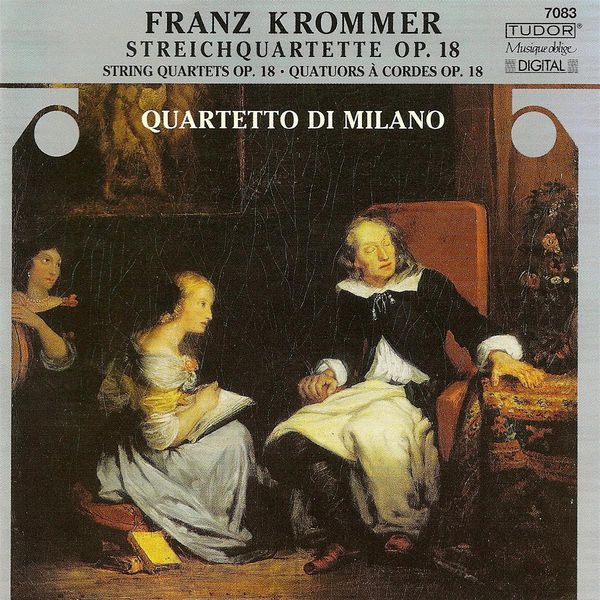
Unlimited Streaming
Listen to this album in high quality now on our apps
Start my trial period and start listening to this albumEnjoy this album on Qobuz apps with your subscription
SubscribeEnjoy this album on Qobuz apps with your subscription
Digital Download
Purchase and download this album in a wide variety of formats depending on your needs.
Viennese composer Franz Krommer was born in Bohemia and also used his birth name, Frantisek Kramar. He was younger than Haydn but slightly older than Beethoven, who at first regarded him as potential competition in the string quartet genre but then stopped worrying. That was because there is little expression in quartets like these; as Quartetto di Milano member Thomas Wicky-Borner put it in his notes, Krommer "hardly ever reveals himself to us in his compositions." Written in the late 1790s, these works belong with the Classical era and not the Romantic, and in the minuet form, where Haydn had said everything that could be said, they are not very interesting. That said, Krommer did absorb one major aspect of Beethoven's string quartet language: like Beethoven's, these are not quartets for amateurs. The first-violin parts require a serious player, and these three quartets in general abound with flashy contrasts in texture and in passages that are big without being quasi-orchestral. The last movement of the String Quartet in D major, Op. 18/1, is an example of a movement that follows Haydn's formal designs but gooses them with fancy fingerwork. The outer movements of all three of these quartets are exciting for the listener, with a vigor that sets them apart from Hummel's expansive structure, and they pose challenges to the players that the Quartetto di Milano surmounts for the most part. Sometimes the group lays on Beethovenian intensity where the music can't really support it, and sometimes when it really digs into the strings they are not perfectly in tune. For the most part, however, this is a good introduction to the string quartets of a nearly forgotten composer of the First Viennese School.
© TiVo
You are currently listening to samples.
Listen to over 100 million songs with an unlimited streaming plan.
Listen to this playlist and more than 100 million songs with our unlimited streaming plans.
From kr133,33/month

Quartetto di Milano, Ensemble
Quartetto di Milano, Ensemble
Quartetto di Milano, Ensemble
Quartetto di Milano, Ensemble
Quartetto di Milano, Ensemble
Quartetto di Milano, Ensemble
Quartetto di Milano, Ensemble
Quartetto di Milano, Ensemble
Quartetto di Milano, Ensemble
Quartetto di Milano, Ensemble
Quartetto di Milano, Ensemble
Quartetto di Milano, Ensemble
Album review
Viennese composer Franz Krommer was born in Bohemia and also used his birth name, Frantisek Kramar. He was younger than Haydn but slightly older than Beethoven, who at first regarded him as potential competition in the string quartet genre but then stopped worrying. That was because there is little expression in quartets like these; as Quartetto di Milano member Thomas Wicky-Borner put it in his notes, Krommer "hardly ever reveals himself to us in his compositions." Written in the late 1790s, these works belong with the Classical era and not the Romantic, and in the minuet form, where Haydn had said everything that could be said, they are not very interesting. That said, Krommer did absorb one major aspect of Beethoven's string quartet language: like Beethoven's, these are not quartets for amateurs. The first-violin parts require a serious player, and these three quartets in general abound with flashy contrasts in texture and in passages that are big without being quasi-orchestral. The last movement of the String Quartet in D major, Op. 18/1, is an example of a movement that follows Haydn's formal designs but gooses them with fancy fingerwork. The outer movements of all three of these quartets are exciting for the listener, with a vigor that sets them apart from Hummel's expansive structure, and they pose challenges to the players that the Quartetto di Milano surmounts for the most part. Sometimes the group lays on Beethovenian intensity where the music can't really support it, and sometimes when it really digs into the strings they are not perfectly in tune. For the most part, however, this is a good introduction to the string quartets of a nearly forgotten composer of the First Viennese School.
© TiVo
About the album
- 1 disc(s) - 12 track(s)
- Total length: 01:06:57
- Main artist: Quartetto di Milano
- Composer: Franz Krommer
- Label: Tudor
- Genre: Classical
 Why buy on Qobuz...
Why buy on Qobuz...
-
Stream or download your music
Buy an album or an individual track. Or listen to our entire catalogue with our high-quality unlimited streaming subscriptions.
-
Zero DRM
The downloaded files belong to you, without any usage limit. You can download them as many times as you like.
-
Choose the format best suited for you
Download your purchases in a wide variety of formats (FLAC, ALAC, WAV, AIFF...) depending on your needs.
-
Listen to your purchases on our apps
Download the Qobuz apps for smartphones, tablets and computers, and listen to your purchases wherever you go.



